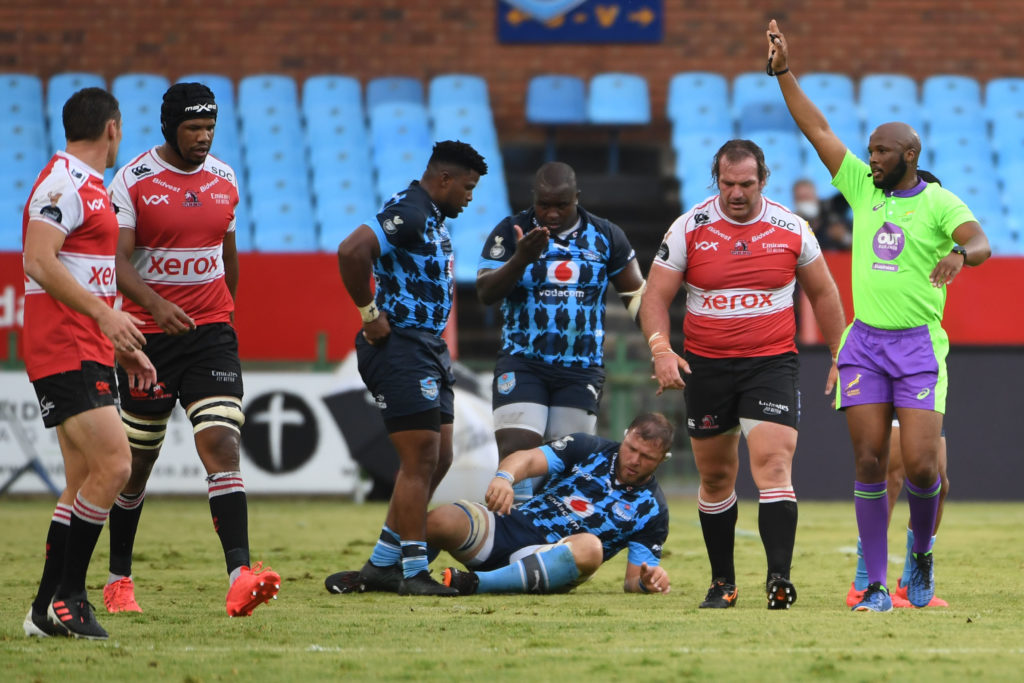Rassie Erasmus says they are fully aware of criticism surrounding the type of rugby being played and refereeing standards in the Currie Cup. DYLAN JACK reports.
Super Rugby Unlocked and the Currie Cup have served as a double round for South Africa’s domestic season, with the semi-finals set to take place on Saturday.
However, particularly in the Currie Cup, fans have been left frustrated by the quality of attacking play being produced by the franchises.
These frustrations were echoed by former Springbok coach Nick Mallett and Erasmus’ former Bok assistant, Swys de Bruin. The duo appeared on SuperSport‘s ‘Final Whistle’ programme and opined that there has been an over-reliance on set pieces from South Africa’s domestic teams.
ALSO READ: Mallett and De Bruin concerned about SA’s domestic product
During a wide-ranging virtual media conference on Monday, Erasmus said that the Springbok coaching group have analysed the domestic games in great detail and are well aware of the low ball-in-play time.
‘I fully get what people are saying about the product on the field,’ Erasmus said. ‘When people mention ball in play, it’s our jobs, we do just that. We analyse guys week in and week out. Every day Jacques and the coaches analyse how many cleans, how many tackles they have made. Every player gets rated on how far they are off the Springbok team.
‘So, we see the stats as we go along and see the problem that the ball in play is down. We talk to the teams and find out what is going on.
‘Everybody knows that there is a 25- or 26-minute ball-in-play time. It’s not rocket science to find that out. Every single player knows his actions from a match. He knows how many tackles he made. We are rating these players to get them ready for Test matches against the British & Irish Lions and the PRO16. We ask these questions.’
Erasmus also sympathised with the players, who have not only had to play in unfamiliar conditions during South Africa’s summer, but have also had to contend with recovering from Covid-19 if they test positive.
‘The recovery is different. People forget, when a guy has got the virus, he has actually been very ill. Even though he may not have had symptoms, although a lot of them do have symptoms. I have had Covid. You get really ill. So when you return to training after 16 days, it’s not as if you are going to be back at the top of your game. You have been out for 16 days and you have been really ill.
‘We have had guys playing on 26 December. That’s totally out of our players’ comfort zones. They have never experienced that. When you’re playing on 1 January, in the heat it is 36 or 37 degrees.’
The talk shifted to the performances of South Africa’s referees, who have also come under plenty of criticism for a number of debatable calls during the season.
However, Erasmus pointed out that due to the structure of the season, referees are currently only taking charge of a game every three weeks, which has made it difficult for them to adjust their game.
ALSO READ: Springboks will do anything to face B&I Lions
Erasmus called on South Africa’s premier referee, Jaco Peyper, for more detail.
‘Obviously, the heat is something which is not known to us,’ Peyper explained. ‘It’s definitely a challenging environment. If you just take the last game I refereed in Nelspruit. I had sunburn after the first half, a proper red ring around my neck. It’s the first time ever in a professional game that I have ever got sunburn in a professional game.
‘It really is different. We have never refereed or played in December and early January. Normally, we start around 20 January with the warm-up games and then from February when it’s a bit better we have our season. It is definitely challenging conditions to play in.
‘As referees, we normally start preparing on a Monday, reviewing the previous game and start preparing for Saturday’s game. On Tuesday, we get our team selections and start communicating with the teams, if there are any issues to address.
‘Now we only get the teams on a Wednesday and start our processes on a Thursday. So, all those things are a little bit under pressure. It all makes for a different week outside your comfort zone going into the game.
‘It’s not an excuse. We have to get used to these conditions and start finding solutions to this.
‘That’s the reality. We don’t get that rhythm as usual when we were reffing three or four times a month. It’s not an excuse, it’s just something we have learned. We didn’t have three warm-up games to actually go through the new interpretations. We got straight into the competition.
‘We haven’t been training with the teams, either. So, to get used to the new interpretations took us longer than we had hoped.
‘Rest assured, we have this sort of platform every week where we try and review and improve our performances. The problem is that it takes another two or three weeks before you get a fixture where you can actually go and fix it.’
Photo: Lee Warren/Gallo Images





